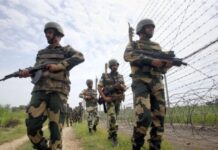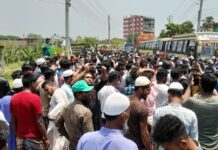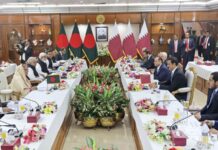 The British parliament was asked on Tuesday whether the time is ripe for London to impose limited sanctions on Bangladesh to mount pressure on premier Sheikh Hasina to hold proper general elections at the earliest.
The British parliament was asked on Tuesday whether the time is ripe for London to impose limited sanctions on Bangladesh to mount pressure on premier Sheikh Hasina to hold proper general elections at the earliest.
“Does the Minister [of State for Foreign and Commonwealth Office] not think that it is time to start applying some form of sanctions to try to get Sheikh Hasina to hold a proper general election as soon as possible?”
Independent parliamentarian Simon Danczuk asked the UK minister of state for foreign and Commonwealth office, Hugo Swire, during a discussion on Bangladesh in British parliament on Tuesday.
Several other British MPs, during the session, expressed their concerns over Bangladesh’s current situationR. The proceedings are available on the UK parliament’s website.
In response, Hugo Swire said he, like all those in House, was absolutely appalled by the senseless murders of the LGBT activists Xulhaz Mannan and Mahbub Tonoy.
“We call on Bangladesh to bring those responsible for the killings to justice. Extremist-related murders of members of minority religious groups and those whose views and lifestyles are contrary to Islam have increased in Bangladesh since February 2015, and we are discussing this regularly with the government of that country.”
He said he raised concerns about human rights and violence against LGBT people again on Tuesday morning with the Bangladeshi high commissioner. “The Minister of State, Department for International Development raised this with the prime minister of Bangladesh during his visit there in August 2015.”
At this stage, a labour party MP, Alex Cunningham, asked Bangladesh government is taking sufficient steps to tackle the issue of violence against LGBT people and Swire replied, “Clearly I do not. We have a certain amount of leverage in Bangladesh-we are the largest grant aid donor, giving £162 million in 2015-16-so our voice has some influence there.”
He continued saying, “In the past year our human rights and democracy programme has provided safety training for bloggers, and we have also funded a project promoting the rights of LGBT groups in Bangladesh, but there is a huge amount more to do. We are not shy of pushing the Government of Bangladesh in the right direction, but sometimes it takes a little bit of time and persuasion.”
In response to another question from a Conservative MP, Nusrat Ghani, Swire said, “There was not only the Daesh-claimed killing … This is becoming an all too familiar occurrence in Bangladesh. There is a disagreement: Prime Minister Sheikh Hasina blames the opposition parties for trying to destabilise the country and the victims for insulting Islam; we think the problem goes beyond that.”
Another Conservative MP, Richard Fuller, asked whether Bangladesh’s “inability to protect human rights and the absence of effective opposition to that [Awami League] government require the UK government, which continues to provide substantial aid to Bangladesh, to have a timetable for intervention to ensure that democracy and human rights continue in that country and do not fall under a single-party state.”
Swire replied, “There is much more we can do in Bangladesh and we are trying, not least through the role of the new Commonwealth Secretary-General.”
In his speech, Simon Danczuk said, “The situation in Bangladesh is rapidly deteriorating. Since the failed general election on 5 January 2014, Bangladesh has gradually slid into chaos. We now see political intimidation, fraudulent elections, disappearances, a loss of media freedom, a breakdown in human rights and the creation of a culture of fear.”
The independent MP also gave some brief examples of human rights violation.
“The police are accused of human rights abuses and of disappearing political opponents. The media are having undue pressure placed on them, and the justice system is now biased and is being used to silence the Government’s political opponents—only last week, a leader of a political opposition party was hanged as a result of the tribunal that is currently taking place in the country.”
He continued saying, “There are three reasons why I raise my concerns about Bangladesh. First, we have to think about the awful human rights abuses people in that country are having to endure. Secondly, as the country slips further into chaos, we should not underestimate the immigration problems we could have here. Our countries are strongly connected, and we have a large diaspora here already. Bangladesh has a population of over 160 million; if civil war breaks out, a lot of asylum seekers will look to come to this country, and we should bear that in mind. Thirdly, civil society has been shrunk in Bangladesh, and that space is now being filled by extremists. The Government rightly talked in the Queen’s Speech about tackling extremism, and one of their priorities must be Bangladesh. Let me briefly illustrate why.”
He said the crimes in Bangladesh were “either al-Qaeda-related or Daesh-related.”
“We are beginning to see extremism flourish. Not only is that alarming for Bangladesh, but it should be concerning for Britain. Given the strong ties between our two countries, many of which should be celebrated, we must be vigilant about some of that extremism transferring from that country to ours,” the MP voiced concern.
The independent MP finished his speech by making a point: “As the situation in Bangladesh escalates, it could have profound consequences for Britain—even at a very local level, in towns such as Rochdale [the constituency of the MP].”
Source: Prothom Alo









